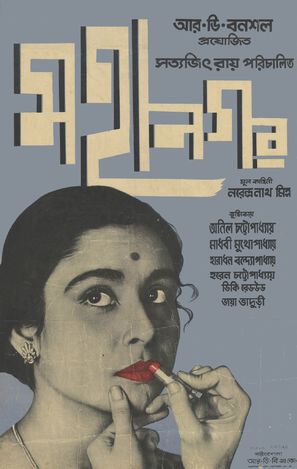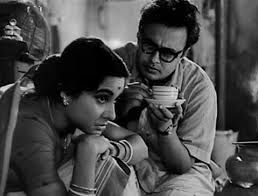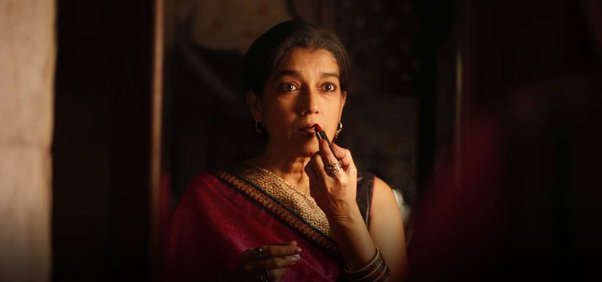While writing a review one often looks at the cinematography, the acting, the screenplay, other technicalities – and rightly so! But I am not a professional critic, but rather an occasional reviewer who is happy to jot their mess down in a diary. Arati, the female protagonist of ‘Mahanagar’ (or ‘The Big City’ – so that you can find it on Letterboxd), was no different from me. Her whole life was concentrated in her home, her underconfident self did not have the slightest idea of her capabilities. Let’s get into the details then.
Shot in Kolkata in the 1950s, this film tells the story of a lower-middle-class ‘Mazumdar’ family of six members with Subrata (Anil Chatterjee) as the sole earning member. In a way, he insists his wife Arati go for a job and tries his best to help her in the job-finding stage. She gets the job as a ‘salesgirl’ with a reasonably pretty first salary. Until now he seems supportive even though his family is pretty conservative – an ideal husband, isn’t it?

Poster for “Mahanagar”
The day she gets her first salary (the day, according to her husband, everybody will accept her as the incoming member), she returns home with an unforeseen
confident smile and lipstick. Everyone indeed accepted her except her father-in-law and husband (men of the house!) For the first time, Subrata shows jealousy towards his lovely wife. He even forced her to resign but in the turn of events, Subrata loses his job in a private bank, and Arati replaces him as the only earning member there.

Arati and Subrata (still from Mahanagar)
Let’s digress here a bit. What comes to your mind when you think of dark red lipstick? A few springs back, we had a somewhat big family get-together. The person who was the only reason to attend them was my aunt. She came with her leather bag wearing crimson lipstick and a white Chiffon saree. She was the embodiment of all those femme fatales I have ever read about. I was still in awe when, all of a sudden, my cousin made a snide comment about her appearance –“তΦিম এত িলপিѶক পের আেদৗও অিফস যাও? ” (Do you even go to the office wearing that much lipstick?) No one stopped her from saying so, no one even apologized on her behalf. That silence was uncomfortable.
That same silence prevailed for a bit when Subrata found that lipstick in Arati’s purse.
In another recent movie ‘Lipstick Under My Burkha’ (2016), we see four women trying to find their happiness on their terms. When Usha (Ratna Pathak Shah), an elderly woman, wanted to get a taste of youth by reading the erotica ‘Lipstick Dreams’ and finally gets humiliated by the people of her very own society for her desires, we feel that maybe nothing changed from 1963 to 2016.

Still from “Lipstick under my burkha”
Arati had to throw her lipstick to gain her husband’s non-existent trust. His paranoia peaked when he watched her from far away talking to a stranger wearing a sunglass.
Edith, Arati’s colleague, and her friend as well, gifted her both lipstick and sunglasses. She helped Arati in the pursuit of unfolding herself. That’s why when in the climax, Edith was fired from her job wrongfully, Usha wearing the lipsƟck (A sƟll from ‘LipsƟck Under My Burkha’)
Arati couldn’t take it and submitted her resignation letter without a second thought. Thereafter we hear the iconic line Arati told her husband – Is there no way two of us can get a job in this big city? And the camera zooms out – two of them walk away and disappear into the crowd.

Edith and Arati (still from Mahanagar)
The film is undoubtedly a milestone in the Bengali film industry, way ahead of its time. The review may remain incomplete if I don’t mention the male gaze in the contemporary or present film industry. Women are mostly perceived as damsels in distress or just objects to be dominated over. In this male-dominated society, Satyajit Ray dared to create a movie about complex feminine emotions, female rage, and all those female urges that were ignored through the ages. Women have always been questioned throughout the world for ages, no matter if it is Ray’s ‘Arati’ or Sylvia Plath. For all those questions, frowns, or unacceptance Sylvia answered her famous fig analogy (from ‘The Bell Jar’), which I would like to quote here as an endnote –
“I saw my life branching out before me like the green fig tree in the story. From the tip of every branch, like a fat purple fig, a wonderful future beckoned and winked. One fig was a husband and a happy home and children, and another fig was a famous poet, … and beyond and above these figs were many more figs I couldn’t quite make out. I saw myself sitting in the crotch of this fig tree, starving to death, just because I couldn’t make up my mind which of the figs I would choose. I wanted each and every one of them, but choosing one meant losing all the rest, and, as I sat there, unable to decide, the figs began to wrinkle and go black, and, one by one, they plopped to the ground at my feet.”
-Writu Dasgupta
